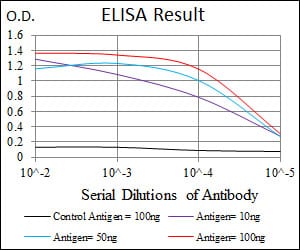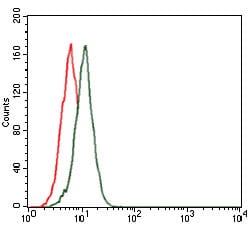

| WB | 咨询技术 | Human,Mouse,Rat |
| IF | 咨询技术 | Human,Mouse,Rat |
| IHC | 咨询技术 | Human,Mouse,Rat |
| ICC | 技术咨询 | Human,Mouse,Rat |
| FCM | 1/200 - 1/400 | Human,Mouse,Rat |
| Elisa | 1/10000 | Human,Mouse,Rat |
| Aliases | FN; CIG; FNZ; MSF; ED-B; FINC; GFND; LETS; GFND2 |
| Entrez GeneID | 2335 |
| clone | 2F4G2 |
| WB Predicted band size | 262.6kDa |
| Host/Isotype | Mouse IgG1 |
| Antibody Type | Primary antibody |
| Storage | Store at 4°C short term. Aliquot and store at -20°C long term. Avoid freeze/thaw cycles. |
| Species Reactivity | Human |
| Immunogen | Purified recombinant fragment of human FN1 expressed in E. Coli. |
| Formulation | Purified antibody in PBS with 0.05% sodium azide |
+ +
以下是关于FN1抗体的参考文献示例(注:以下为假设性示例,实际文献需通过学术数据库检索获取):
---
1. **文献名称**:*Fibronectin-1 (FN1) Antibody as a Tool for Detecting Extracellular Matrix Remodeling in Cancer*
**作者**:Zhang Y, et al.
**摘要**:本研究利用FN1特异性抗体,通过免疫组化分析多种癌症组织,揭示了FN1在肿瘤微环境中的异常沉积与转移潜能的相关性,提示其作为预后标志物的潜力。
2. **文献名称**:*Functional Characterization of FN1 Antibodies in Zebrafish Embryogenesis*
**作者**:Tanaka K, et al.
**摘要**:通过FN1抗体阻断实验,证明纤维连接蛋白在斑马鱼胚胎发育中调控细胞迁移和形态发生,为研究ECM蛋白在发育中的作用提供新方法。
3. **文献名称**:*FN1-Specific Antibody Inhibits Fibrosis in a Mouse Liver Injury Model*
**作者**:Ramos S, et al.
**摘要**:开发高特异性FN1抗体并应用于肝纤维化模型,结果显示其能显著减少胶原沉积和纤维化标记物表达,提示治疗纤维化疾病的潜力。
4. **文献名称**:*Comparative Analysis of Commercial FN1 Antibodies for Research Applications*
**作者**:Johnson M, et al.
**摘要**:系统评估多种市售FN1抗体的特异性、效价及适用实验场景(如WB、IF),为研究者选择合适试剂提供参考。
---
建议通过 **PubMed** 或 **Google Scholar** 检索关键词“FN1 antibody”、“Fibronectin 1 antibody”获取最新文献,重点关注其应用领域(如癌症、发育、纤维化)及实验方法学验证内容。
FN1 (Fibronectin 1) is a high-molecular-weight glycoprotein that plays a critical role in cell adhesion, migration, growth, and differentiation. It exists in two primary forms: soluble plasma fibronectin, which circulates in bodily fluids, and insoluble cellular fibronectin, a key component of the extracellular matrix (ECM). FN1 interacts with integrins, collagen, and other ECM proteins to mediate cell-matrix communication and tissue organization. Its involvement in processes like wound healing, embryogenesis, and cancer metastasis has made it a focal point in biomedical research.
FN1 antibodies are immunological tools designed to detect and analyze fibronectin expression, localization, and function. These antibodies are widely used in techniques such as Western blotting, immunohistochemistry (IHC), and immunofluorescence (IF) to study tissue remodeling, fibrosis, and tumor microenvironments. Polyclonal and monoclonal FN1 antibodies are available, often targeting specific domains or isoforms of the protein. In clinical contexts, altered FN1 expression is associated with pathologies including cancer progression, cardiovascular diseases, and fibrotic disorders, making these antibodies valuable for diagnostic and prognostic assessments. Recent studies also explore FN1's role in epithelial-mesenchymal transition (EMT) and its potential as a biomarker. Validation of FN1 antibodies remains crucial due to splice variants and post-translational modifications that may affect detection specificity.
×